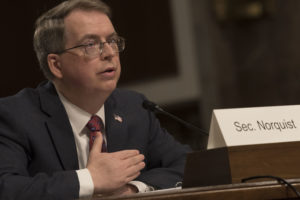The Deputy Secretary of Defense told lawmakers on Wednesday the Pentagon’s recently failed audit was expected as the department makes incremental improvements to address lagging inefficiencies, noting he predicts a majority of the department’s agencies will receive a clean audit within the next five years.
David Norquist said during a Senate Subcommittee on Readiness and Management Support hearing the department has already found cost savings after completing a full financial audit, and expected the $1 billion cost of the audit process to fall in coming years as officials gather more complete inventory data.

“The audit demonstrates progress, but we have a lot more to do,” Norquist said. “We have already seen benefits, savings and return on investments that I had not expected to see this early, long before the point where I expected the costs to come down.”
The Pentagon was able to close over 550 of the 2,377 findings uncovered in the fiscal year 2018 audit, its first ever department-wide financial statement, while noting that auditors did find 1,300 new mismanagement issues for the department to address.
“Last week the department announced that it had ‘officially failed’ the 2019 audit. That’s not surprising. I think, actually, you would have found a great deal of skepticism on this committee if the 2019 report had said ‘hey, everything’s fine,’” Sen. Tim Kaine (D-Va.), the subcommittee’s ranking member, said during his opening remarks. “When you start something as complex as this, if you’re not finding areas to improve, failings that need to be corrected, then you lead policymakers to question the veracity or the sufficiency of the effort.”
Norquist, who led the effort to start the Pentagon’s audit process, said this year’s process included 1,600 auditors conducting over 400 site visits, with 60 percent of installations and offices receiving a clean notice.
Seven of the Pentagon’s 24 agencies and offices received a clean audit, while Norquist added that for the department to officially ‘pass’ its financial statement every one must receive receive a clean opinion.
“I would expect every year to see movement forward, like another agency getting a clean opinion or people moving to modified. Within 5 or so years, I’d expect you to see the majority of [DoD’s agencies] with a clean opinion,” Norquist said. “You’ll see different parts get to clean opinion. You’ll see the number of problems going down. You’ll see some where they only have a single issue holding them up. That’s very helpful for focusing it.”
Lawmakers pressed Norquist on the $1 billion required to conduct a department-wide audit, which included $200 million paid out to the auditors, $250 million in contracts to support the work and another $500 million toward remediation efforts.
Norquist said, as agencies continue to gather complete data on their inventories as a result of subsequent audits, he expects the cost to fall by at least $400 million over the next several years.
“The contracts basically say keep auditing even if you think we’re going to fail. We want as many problems as you can find,” Norquist said.